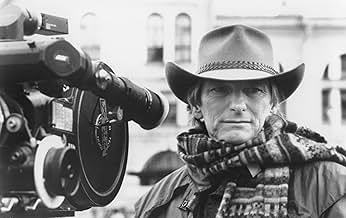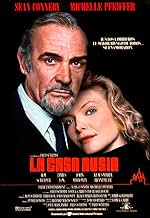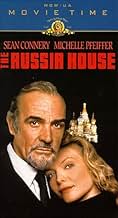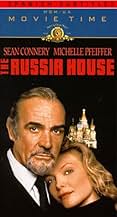IMDb-BEWERTUNG
6,1/10
18.933
IHRE BEWERTUNG
Ein im Ausland lebender britischer Verleger arbeitet unerwartet für den britischen Geheimdienst, um gegen Menschen in Russland zu ermitteln.Ein im Ausland lebender britischer Verleger arbeitet unerwartet für den britischen Geheimdienst, um gegen Menschen in Russland zu ermitteln.Ein im Ausland lebender britischer Verleger arbeitet unerwartet für den britischen Geheimdienst, um gegen Menschen in Russland zu ermitteln.
- Regie
- Drehbuch
- Hauptbesetzung
- Auszeichnungen
- 1 Gewinn & 5 Nominierungen insgesamt
Ian McNeice
- Merrydew
- (as Ian McNiece)
Peter Marinker
- U.S. Scientist
- (as Peter Mariner)
Empfohlene Bewertungen
Films that require you to pay close attention to every little detail and have a complex plot from the outset can generally be thrust into one of two categories: Stimulating and intellectual, or potential insomnia cures. The Russia House is the former... so keep taking the Nytol. There's much languid talk about politics, international trade, the Cold War, espionage... and for those expecting Sean Connery to slap on a tux and start blowing people away, and going to be sorely disappointed. If on the other hand, you LISTEN to what is being said and are open to the idea of getting small rewards along the way rather than shallow exhibitionism, than this may be right up your street.
Make sure all the windows are closed, the children are in bed, your bladder is empty... because you don't want any meaningless distractions while the story is being told. Not that it moves at a fast pace, but inconsequential moments have repercussions for later on, and simple snatches of dialogue could hold invaluable clues. Russia's never looked better, and the chief photographer captures Moscow in all it's architectural splendour. The much missed Connery (He's retired from acting now, believe it or not) does a sterling job as the amateur spy who doesn't know what side he's on, and sex-on-legs Pfeiffer has a dead-on Russian accent. At least to this untrained ear.
Maybe not for action junkies, but anyone else who appreciates much subtler qualities in film... Please step this way. 7/10
Make sure all the windows are closed, the children are in bed, your bladder is empty... because you don't want any meaningless distractions while the story is being told. Not that it moves at a fast pace, but inconsequential moments have repercussions for later on, and simple snatches of dialogue could hold invaluable clues. Russia's never looked better, and the chief photographer captures Moscow in all it's architectural splendour. The much missed Connery (He's retired from acting now, believe it or not) does a sterling job as the amateur spy who doesn't know what side he's on, and sex-on-legs Pfeiffer has a dead-on Russian accent. At least to this untrained ear.
Maybe not for action junkies, but anyone else who appreciates much subtler qualities in film... Please step this way. 7/10
An American spy drama and romance; A story about a British publisher persuaded to go undercover to investigate the motive of an author who is exposing Soviet secrets. Adapted from John le Carré's novel, a compelling glossy drama with a theme about the resurrection of buried hopes by betrayal. It is notable for capturing a plausibility of the realities of the time-Perestroika and post-glasnost Russia. The direction is subtle for a story that is reserved, though it occasionally gets sluggish in the plot with its standard-fare espionage. What carries the film, though, is the character-driven intrigue, witty dialogue, and strong emotional core. Connery's performance is complex, as the flawed publisher is attracted to Pfeiffer's charming go-between, a performance that is also persuasive and credible. There is fine support from Klaus Maria Brandauer as the mysterious scientist and Roy Scheider and James Fox as the bickering spy chiefs under pressure. Aside from the escapism and beautiful locales, easily the most exquisite filmic element is the critically acclaimed musical score by Jerry Goldsmith, which sweeps the audience along through the mood of places, national characteristics, and the main character's relationship.
My first comment for this site....exciting stuff.
Prompted to write this by seeing this again on video - the third time for me, and it's rare that I want to see anything three times. And I realized that it's fascination still holds....this is one of my top 10, definitely.
The reasons I would rate this a "9", while somebody else would give it a "5.9" are largely personal....i think it always comes down to the personal. Talk all we want, when we watch a movie - as when we eat a meal, or kiss someone - the pleasure center in the brain either lights up or doesn't. For me it's all about the love of a place...for Scott Barley Blair it's early Glastnost Russia, for me it's 90's Germany - Hamburg, Berlin...the strangeness, the trueness of people who surround you in such a place and your love for them because of this. The fact that a film can light up specific sense memories like these means that it is true - at least in that respect. This is a remarkably honest film - terrifically unsensational for a spy film and one of the rare "love stories" that delivers the satisfactions expected of a "love story" without getting mawkish. Everything rings true here except for the ending (a fabricated "happy ending" which is the only thing that kept me from rating this a 10).
To ask for Manchurian Candidate type excitement from this low key film is wrong. The suspense, which is remarkably sustained (those rich long tracking shots of people walking through public places to uncertain destinations to meet with, or maybe not meet with shadow characters who may be allies or enemies) is the truer suspense of the uncertainty of living in a gray, gray world...where nothing much happens, but peril is part of the fabric of mundane life.
(Those sequences are gorgeous....the colors of autumn in a Leningrad park, the closeups of the stone gargoyles....the moody circular stepping pace of the soundtrack....Branford Marsalis' saxophone.) Someone has said here that it is talky. Yes, it is talky...but the talk is brilliant...it is the perfect reflection of a world where everyone - book publishers and bureaucrats and spies alike speaks in mannered, ritualized streams of code. This is not disinformation - it is perfectly understood by all, a language that has supplanted the language of an earlier age in which sincerity was an option.
Besides that ending, the piece is perfectly faithful to LeCarre's novel. LeCarre's books have had good luck when being translated into movies. Of the eight or so that have been adapted, four have made great films: The Spy Who Came into the Cold, The Russia House, and the two George Smiley BBC miniseries. LeCarre is a great writer and more specifically great at plotting and dialogue, and these films all succeed pretty much by filming what is written unadorned and pouring on the atmosphere. And they are blessed with lead performances by three great actors at the top of the form - Richard Burton, Sean Connery and Alec Guiness (Guiness especially...to watch him for six hours in Smiley's People is one of the great pleasures).
A beautifully efficient and elegant translation by Tom Stoppard of a great novel, wonderfully dignified and touching performances by Connery and Michelle Pfeiffer (never seen her better), a beautiful soundtrack by a second tier composer graced by the presence of a real jazz master, a terrific evocation of a place and time....a very moving film.
Prompted to write this by seeing this again on video - the third time for me, and it's rare that I want to see anything three times. And I realized that it's fascination still holds....this is one of my top 10, definitely.
The reasons I would rate this a "9", while somebody else would give it a "5.9" are largely personal....i think it always comes down to the personal. Talk all we want, when we watch a movie - as when we eat a meal, or kiss someone - the pleasure center in the brain either lights up or doesn't. For me it's all about the love of a place...for Scott Barley Blair it's early Glastnost Russia, for me it's 90's Germany - Hamburg, Berlin...the strangeness, the trueness of people who surround you in such a place and your love for them because of this. The fact that a film can light up specific sense memories like these means that it is true - at least in that respect. This is a remarkably honest film - terrifically unsensational for a spy film and one of the rare "love stories" that delivers the satisfactions expected of a "love story" without getting mawkish. Everything rings true here except for the ending (a fabricated "happy ending" which is the only thing that kept me from rating this a 10).
To ask for Manchurian Candidate type excitement from this low key film is wrong. The suspense, which is remarkably sustained (those rich long tracking shots of people walking through public places to uncertain destinations to meet with, or maybe not meet with shadow characters who may be allies or enemies) is the truer suspense of the uncertainty of living in a gray, gray world...where nothing much happens, but peril is part of the fabric of mundane life.
(Those sequences are gorgeous....the colors of autumn in a Leningrad park, the closeups of the stone gargoyles....the moody circular stepping pace of the soundtrack....Branford Marsalis' saxophone.) Someone has said here that it is talky. Yes, it is talky...but the talk is brilliant...it is the perfect reflection of a world where everyone - book publishers and bureaucrats and spies alike speaks in mannered, ritualized streams of code. This is not disinformation - it is perfectly understood by all, a language that has supplanted the language of an earlier age in which sincerity was an option.
Besides that ending, the piece is perfectly faithful to LeCarre's novel. LeCarre's books have had good luck when being translated into movies. Of the eight or so that have been adapted, four have made great films: The Spy Who Came into the Cold, The Russia House, and the two George Smiley BBC miniseries. LeCarre is a great writer and more specifically great at plotting and dialogue, and these films all succeed pretty much by filming what is written unadorned and pouring on the atmosphere. And they are blessed with lead performances by three great actors at the top of the form - Richard Burton, Sean Connery and Alec Guiness (Guiness especially...to watch him for six hours in Smiley's People is one of the great pleasures).
A beautifully efficient and elegant translation by Tom Stoppard of a great novel, wonderfully dignified and touching performances by Connery and Michelle Pfeiffer (never seen her better), a beautiful soundtrack by a second tier composer graced by the presence of a real jazz master, a terrific evocation of a place and time....a very moving film.
The Russia House is a superior spy romance movie which falls short of being great. Additionally a couple of factors have been unkind to it over time.
Connery and Pfeiffer are excellant; the large cast are almost uniformly outstanding (except perhaps Roy Scheider, who I usually like, but who seems a bit over the top in his role here); the Moscow scenery and end of the Cold War feel are great, and the main characters are easy to like, if difficult to outright love. On the down side the writing assumes too much in expecting the audience to stay on top of the espionage jargon and intrigue, added to the non-linear plot. Let your attention wander and you'll lose your way. If it had been a little easier to follow, it would have left more room for dramatic tension, which was adequate but seldom riveting.
When I said that time has been unkind to The Russia House, I meant two things: firstly that the unfortunate timing of the movie's release, a year before the collapse of the Soviet Union, ensured that it would be dated almost immediately. More significantly, a growing portion of the film's potential audience didn't live through the late Soviet Era, and the nuances of concepts like Glasnost, and why Perestroika makes it hard for Pfeiffer to do her shoe-shopping aren't going to mean a thing to anyone much under 30.
But that's not the movie's fault. Russia House is still a quality, enjoyable drama with a great cast, even if it's somewhat ponderous and slow-moving, and complex. And oh yes - it has James Fox. A film like this without James Fox would have been like a table with three legs.
7 out of 10
Connery and Pfeiffer are excellant; the large cast are almost uniformly outstanding (except perhaps Roy Scheider, who I usually like, but who seems a bit over the top in his role here); the Moscow scenery and end of the Cold War feel are great, and the main characters are easy to like, if difficult to outright love. On the down side the writing assumes too much in expecting the audience to stay on top of the espionage jargon and intrigue, added to the non-linear plot. Let your attention wander and you'll lose your way. If it had been a little easier to follow, it would have left more room for dramatic tension, which was adequate but seldom riveting.
When I said that time has been unkind to The Russia House, I meant two things: firstly that the unfortunate timing of the movie's release, a year before the collapse of the Soviet Union, ensured that it would be dated almost immediately. More significantly, a growing portion of the film's potential audience didn't live through the late Soviet Era, and the nuances of concepts like Glasnost, and why Perestroika makes it hard for Pfeiffer to do her shoe-shopping aren't going to mean a thing to anyone much under 30.
But that's not the movie's fault. Russia House is still a quality, enjoyable drama with a great cast, even if it's somewhat ponderous and slow-moving, and complex. And oh yes - it has James Fox. A film like this without James Fox would have been like a table with three legs.
7 out of 10
As a great admirer of John Le Carre, I watched this film with high expectations & although the story wasn't the usual Le Carre (such as 'The Spy Who Came In From The Cold'), I enjoyed it immensely. It is a combination of a good old-fashioned romance & a look at what happens when an ordinary man is brought into the world of espionage. Connery is very good as the boozy, world-weary publisher who considers personal relationships more important than Cold War one-upmanship. Michelle Pfeiffer, apart from being very pleasing to the eye as usual, was also pretty believable as the Russian trying to do the right thing. What's more, Klaus Maria Brandauer deserves an honourable mention as well. OK, the plot is complicated & sometimes hard to follow, as are most of Le Carre's works (& also, doubtless, the real world of espionage), but it is worth the effort. If you are seeking a simple good guy beats bad guy film, then don't watch this or any other realistic spy film. If, however, you want a story that manages to combine cynicism & romance, I recommend this one.
Wusstest du schon
- WissenswertesThe meaning and relevance of the title "The Russia House" is that it refers to the nickname given to the section of the British Secret Service that was assigned to investigating the Soviet Union.
- PatzerDuring Blair's "start the avalanche" speech, Dante is seen at the end of the table. As the camera pans around the table during the speech, Dante disappears from the end of the table, and then reappears.
- Crazy CreditsThe credits appear over a series of clips showing location shots from the film, concluding with a repeat of the final scene.
- VerbindungenFeatured in A Tribute to Sean Connery (1990)
Top-Auswahl
Melde dich zum Bewerten an und greife auf die Watchlist für personalisierte Empfehlungen zu.
Details
- Erscheinungsdatum
- Herkunftsland
- Offizieller Standort
- Sprachen
- Auch bekannt als
- The Russia House
- Drehorte
- Lissabon, Portugal(on location)
- Produktionsfirmen
- Weitere beteiligte Unternehmen bei IMDbPro anzeigen
Box Office
- Budget
- 21.800.000 $ (geschätzt)
- Bruttoertrag in den USA und Kanada
- 22.997.992 $
- Eröffnungswochenende in den USA und in Kanada
- 4.435.650 $
- 25. Dez. 1990
- Weltweiter Bruttoertrag
- 22.997.992 $
Zu dieser Seite beitragen
Bearbeitung vorschlagen oder fehlenden Inhalt hinzufügen

Oberste Lücke
By what name was Das Russland-Haus (1990) officially released in India in Hindi?
Antwort





































